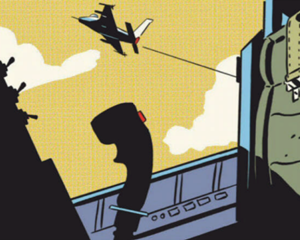This matters not only in the context of immediate military success. Many people worry about handing too much autonomy to weapons of war—particularly when civilian casualties are possible. International humanitarian law requires that any civilian harm caused by an attack be no more than proportionate to the military advantage hoped for. An AI, which would be hard to imbue with relevant strategic and political knowledge, might not be able to judge for itself whether an attack was permitted.
這不僅關(guān)系到軍事上的直接勝利。許多人擔(dān)心給予戰(zhàn)爭武器太多自主權(quán),尤其是在可能造成平民傷亡的情況下。國際人道主義法要求,由攻擊造成的任何平民傷害必須與期望獲得的軍事優(yōu)勢成比例。人工智能很難被灌輸相關(guān)的戰(zhàn)略和政治知識,它可能無法自己判斷攻擊是否被允許。
Of course, a human being could pilot an uncrewed plane remotely, says Mr Colosimo. But he doubts that communications links will ever be sufficiently dependable, given the "contested and congested electromagnetic environment". In some cases, losing communications is no big deal; a plane can fly home. In others, it is an unacceptable risk. For instance, FCAS aircraft intended for France's air force will carry that country's air-to-surface nuclear missiles.
當(dāng)然,人類可以遠程駕駛無人駕駛飛機,科洛西莫表示。但是,考慮到“競爭激烈的、擁擠的電磁環(huán)境”,他擔(dān)憂通信是否足夠可靠。在某些情況下,失去聯(lián)絡(luò)并不是什么大問題,飛機可以飛回家。但在其他情況下,這是一項無法接受的風(fēng)險。比如,為法國空軍設(shè)計的FCAS飛機將攜帶該國的空對地核導(dǎo)彈。

The priority for now, therefore, is what armed forces call "manned-unmanned teaming". In this, a pilot hands off some tasks to a computer while managing others. Today's pilots no longer need to point their radars in the right direction manually, for instance. But they are still forced to accelerate or turn to alter the chances of the success of a shot, says Colonel Javorsek. Those, he says, "are tasks that are very well suited to hand over".
所以,目前的首要任務(wù)是軍隊所稱的“人工-無人機組合”。在這種情況下,飛行員在將一些任務(wù)交給計算機的同時管理其他任務(wù)。例如,現(xiàn)在的飛行員無需再手動調(diào)整雷達的方向。但賈沃塞克上校表示,他們?nèi)砸黄燃铀倩蜣D(zhuǎn)向來改變一次射擊成功的機會。他說,這些“都是非常適合移交的任務(wù)”。
One example of such a handover comes from Lockheed Martin, an American aerospace giant. It is developing a missileavoidance system that can tell which aircraft in a formation of several planes is the target of a particular missile attack, and what evasive actions are needed. This is something that currently requires the interpretation by a human being of several different displays of data.
美國航空航天巨頭洛克希德·馬丁公司就是這種“任務(wù)移交”的一個例子。該公司正在研發(fā)一種導(dǎo)彈規(guī)避系統(tǒng),該系統(tǒng)能夠識別由數(shù)架飛機組成的編隊中哪架飛機是特定導(dǎo)彈攻擊的目標(biāo)以及需要采取何種規(guī)避行動。目前這需要人類對幾種不同的數(shù)據(jù)顯示進行解釋。
Another example is ground-collision avoidance. In 2018 a team led by the American air force, and including Lockheed Martin, won the Collier Trophy, an award for the greatest achievement in aeronautics in America, for its Automatic Ground Collision Avoidance System, which takes control of a plane if it is about to plough into the terrain. Such accidents, which can happen if a pilot experiencing severe g-forces passes out, account for three-quarters of the deaths of F-16 pilots. So far, the system has saved the lives of ten such pilots.
另外一個例子是避免地面碰撞。2018年,由美國空軍(包括洛克希德·馬丁公司(Lockheed Martin)在內(nèi)的一個團隊?wèi){借其自動地面避碰系統(tǒng)贏得了科利爾獎(美國航空領(lǐng)域最偉大成就獎),該系統(tǒng)可以在飛機即將撞上地面時控制飛機。這類事故占F-16戰(zhàn)斗機飛行員死亡人數(shù)的四分之三。目前為止該系統(tǒng)已經(jīng)挽救了10名這樣的飛行員的生命。
譯文由可可原創(chuàng),僅供學(xué)習(xí)交流使用,未經(jīng)許可請勿轉(zhuǎn)載。











